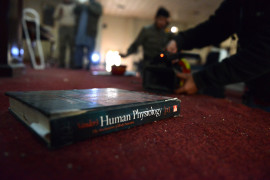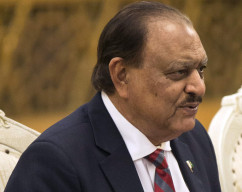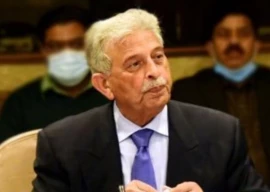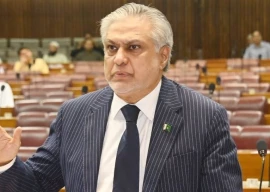
The barbaric massacre which caused 148 deaths has struck a chord in the heart of all and has emboldened the power of the pen. The urgency to raise their voice against this atrocity has blurred the boundaries between street poets and senior poets as both have expressed their grief over the tragedy through gut-wrenching poems.

A large number of poems and songs condemning the incident have been circulated through text messages and on social media. These poems have not only captured the brutality of the attack in vivid detail but also provided the people with a shred of hope to deal with the crisis.
Iqbal Shakir, a well-known Pashto poet from Malakand, has written a few verses which have received immense popularity over a short period of time:
“I wrote this piece during the night of the Peshawar tragedy,” Shakir tells The Express Tribune. “The incident has certainly affected every aspect of our lives.”
According to the poet, the poem reflects the psyche of mothers who are afraid to send their children to schools under the prevailing circumstances.
Shakir believes poets are the eyes and ears of society. “How can we fall silent during such a tragedy,” he explains. “Peshawar is the cultural centre of Pukhtuns. No matter where we are in the world, our love for the city will not fade away. In fact, a massacre of this nature only brings them together.”
Shakir also teaches Pashto literature at Government Degree College in Malakand.

“As a father and a teacher, I can understand the impact of the tragedy,” he says. “The only way I can vent my frustrations is through my poetry.”
Charged with emotion
According to Dr Israr Atal, Pashto poetry has always been used to give expression to the traumas of war and political uncertainty.
“For centuries, war has been a prevalent theme in Pashto poetry,” he explains. “Rahman Baba, Khushal Khan Khattak, Hamza Shinwari, Ikramullah Gran and many others have written gut-wrenching verses about this matter.”
Atal has written a poem titled Ages on dark pages which is based on the December 16 massacre.
However, Atal claims the incident has not elicited too strong a reaction from poets.
“This is because people do not follow poets or give them the respect they deserve in society,” he says.
Nonetheless, some poets have managed to convey the trauma and all-consuming grief surrounding this tragedy in a powerful and sensitive manner.
Orbala, a pseudonym for a female Pashto poet based in America who originates from Swat, tells The Express Tribune that she wrote Khuga Peshawara (O’ Wounded Peshawar) in the wake of the barbaric attack.
A verse from the poem reads:
My heart breaks, Mother, that it’s raining death/
Today in Pekhawar, Pashtuns’ blood is being shed/
The tor kamis (shirt)
is now our coffin/
Beloved, come home – the fresh flowers have wilted and died/
The flower (child) has turned into ashes, every sound heaves a sigh/
Look at that mother over there; she’ll yearn eternally for her child
“There is a popular Pashto folk song, where a woman tells her beloved to go to Peshawar and bring back black stunning dress along a couple of fresh flowers,” Orbala says. “That’s where I’ve derived my imagery from.”
Published in The Express Tribune, December 22nd, 2014.



























1714024018-0/ModiLara-(1)1714024018-0-270x192.webp)









COMMENTS
Comments are moderated and generally will be posted if they are on-topic and not abusive.
For more information, please see our Comments FAQ